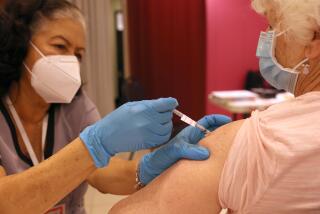Law Protects Sick Workers, Court Rules : Bias Law Covers Ailing Workers, High Court Says
- Share via
WASHINGTON — The Supreme Court, in a ruling likely to help AIDS victims fight employment discrimination, said today that a federal law aiding the handicapped protects people with contagious diseases against on-the-job bias.
By a 7-2 vote, the court ruled that all recipients of federal aid, including government contractors and virtually all public schools, may not discriminate against people with contagious diseases if those people are “otherwise qualified” to work or take part in some activity.
The decision, however, did not directly involve acquired immune deficiency syndrome, a viral disease that can kill its victims by destroying their immune system and leaving them vulnerable to other diseases.
Teacher’s Lawsuit
The ruling revived a lawsuit by former third-grade teacher Gene H. Arline, fired by the Nassau County, Fla., School Board because she was diagnosed as having tuberculosis, an infectious respiratory disease.
Arline’s lawyers contended that the school board never tried to accommodate her handicap by, for example, finding her some non-teaching job within the school system.
The court, led by Justice William J. Brennan, rejected Reagan Administration arguments that employers do not violate a 1973 law barring bias against the handicapped if they fire employees based solely on a fear that they may spread a disease.
At an argument session before the justices last December, Solicitor Gen. Charles Fried acknowledged that Arline is a handicapped person. But he contended that she was not discriminated against because of her handicap, but because of her alleged contagiousness.
But Brennan wrote: “It would be unfair to allow an employer to seize upon the distinction between the effects of a disease on others and the effects of a disease on a patient and use that distinction to justify discriminatory treatment.”
‘Inconsistent’ With Law
He said allowing discrimination based on a disease’s contagious effects “would be inconsistent with the basic purpose” of the 1973 law, “which is to ensure that handicapped individuals are not denied jobs or other benefits because of the prejudiced attitudes or the ignorance of others.”
His opinion noted that the court was not deciding today “whether a carrier of a contagious disease such as AIDS could be considered to have a physical impairment, or whether such a person could be considered, solely on the basis of contagiousness, a handicapped person as defined by the (law).”
Despite that limiting language, the decision represents a huge victory for gay rights activists.
James Kellogg, staff attorney for the Lambda Legal Defense and Education Fund, a group fighting for homosexual rights, said AIDS discrimination cases have been on hold throughout the country pending today’s court ruling and now appear likely to be resolved in favor of AIDS victims.
“I think this will clear the bottleneck,” Kellogg said. “Everybody has been more or less holding their breath on both sides. This gives us a clear legal precedent.”
More to Read
Sign up for Essential California
The most important California stories and recommendations in your inbox every morning.
You may occasionally receive promotional content from the Los Angeles Times.













